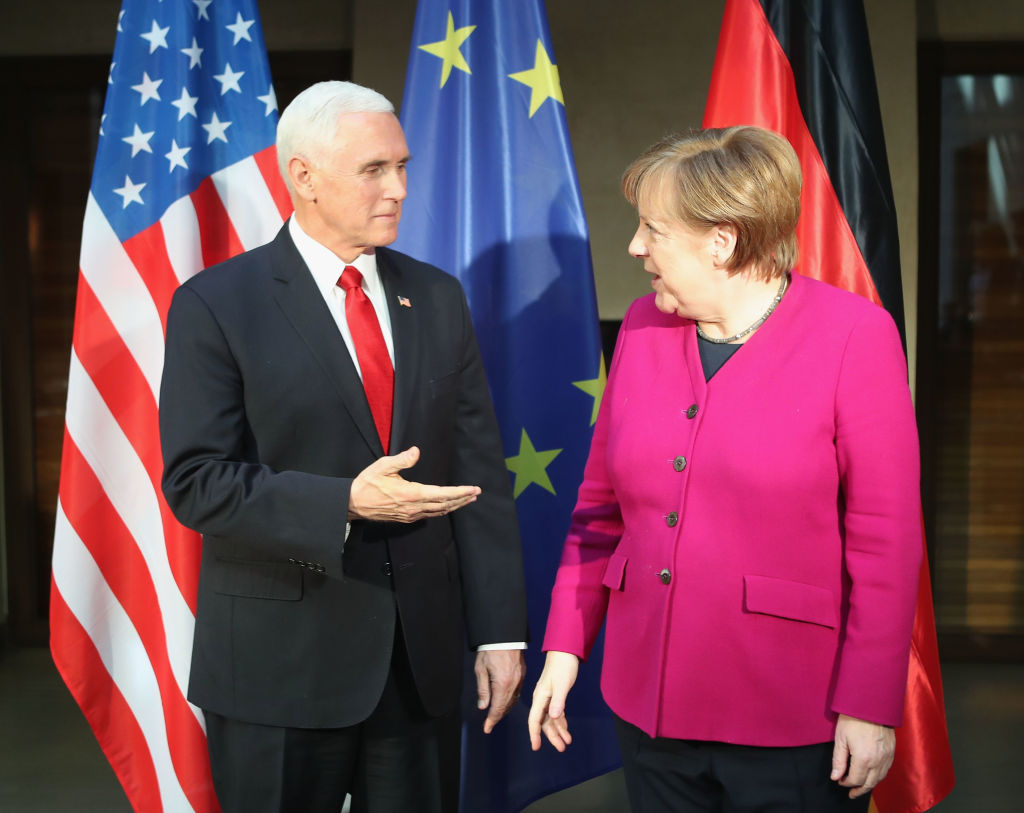
During his speech to the Munich Security Conference in 2007, Russian President Vladimir Putin made a prediction that many in the West dismissed. He said the Western system of alliances — with its “one master, one sovereign” sitting in Washington, D.C. — would eventually “destroy itself from within.”
That speech has aged remarkably well. Twelve years on, as world leaders gathered in Munich again for their annual summit, the Europeans in attendance admitted that Putin had been right. As German Chancellor Angela Merkel put on Feb. 16, the global order had “collapsed into many tiny parts.”
That seemed clear enough from the disputes that raged throughout the Munich forum between the U.S. and its European allies, ranging from issues of trade to climate change and nuclear arms. Russia and other American rivals seized the chance to pry the West even further apart.
“It’s Diplomacy 101,” Ernest Moniz, the veteran U.S. nuclear negotiator and former Secretary of Energy under President Barack Obama, told TIME after attending several of the closed-door sessions with European diplomats. “If a wedge opens up, you exploit it. You drive it as deep as you can.”
Russia and China both put that tactic to use in Munich. Yang Jiechi, the attending member of China’s Politburo, urged his “strategic partners” in Europe to break their dependence on U.S. technology. “We should reject technological hegemony,” he told the crowd of European leaders, appealing for support in China’s escalating trade war with the U.S. and, in particular, the dispute over Huawei, the Chinese industrial giant which the U.S. has accused of violating sanctions and stealing Western technology. “Power politics should be rejected,” Yang added.
Russia made a similar appeal. The head of its delegation, Foreign Minister Sergei Lavrov, even suggested building a “shared European home” with Russia that would leave the Americans out. Iran also got in on the action, with Mohammed Javad Zarif, its top diplomat, urging Europe’s leaders not to “succumb” to the bullying of the Trump Administration.
Zarif’s most immediate goal in Munich was to salvage the nuclear agreement that Trump withdrew from last year. Despite intense pressure from the White House, the Europeans have stood with Iran on that issue. France, Germany and the U.K. have even continued to trade with Iran in circumvention of U.S. sanctions.
Chancellor Merkel insisted that Germany would stick with that position. She also echoed the Chinese delegate in defending free trade in a globalized economy. “We have to fight for multilateralism,” Merkel said, invoking a term that Yang, the Politburo member, used at least 20 times in his speech.
Despite fierce U.S. objections, the Europeans have continued building bridges to the East. Russia’s new gas pipeline to Germany – North Stream 2 – is expected to make Europeans even more reliant on Russia for energy. China’s global infrastructure project – known as the Belt and Road initiative – will soon bind its economy much more closely to that of Europe, an aim that Merkel intends to promote when her country holds the European Union presidency next year.
“The Americans expect the Europeans to follow along,” says Thomas Kleine-Brockhoff, the head of the Berlin office of the German Marshall Fund of the United States. “They will find that Europe won’t.”
Many Europeans support that approach. A Pew Research survey published on Feb. 15 found that only around 10% of people in France and Germany have faith in Trump’s handling of global affairs; they are two or three times more likely to trust the leaders of Russia and China.
The visit from Vice President Mike Pence, who led the U.S. delegation to Munich, does not seem likely to change that. In a message that many in the audience perceived as a veiled threat, he warned the Europeans that they would only hurt their own security by making deals with Russia and China.
“We cannot ensure the defense of the West if our allies grow dependent on the East,” Pence said. But whether the U.S. likes it or not, that dependence is already growing. As their ties with the Trump Administration grow more fraught, the Europeans are finding easy friends among America’s traditional enemies.
More Must-Reads from TIME
- Why Trump’s Message Worked on Latino Men
- What Trump’s Win Could Mean for Housing
- The 100 Must-Read Books of 2024
- Sleep Doctors Share the 1 Tip That’s Changed Their Lives
- Column: Let’s Bring Back Romance
- What It’s Like to Have Long COVID As a Kid
- FX’s Say Nothing Is the Must-Watch Political Thriller of 2024
- Merle Bombardieri Is Helping People Make the Baby Decision
Contact us at letters@time.com